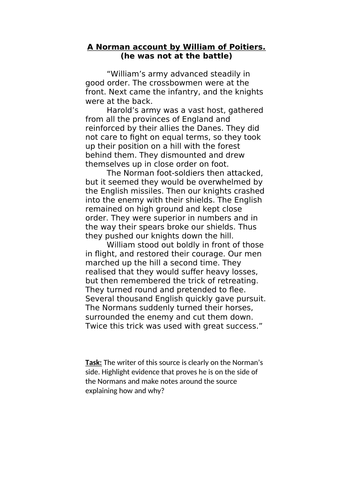







This KS3 unit should take 2-3 hours to complete. The Power Point leads the students through all of the activities with accompanying resources included. Advice on writing technique is also included.
Aims and Objectives:
- To know the main events of the Battle of Hastings.
- To understand the main reasons why William won.
- To reach a verdict on which reasons were more or less important.
- To be able to write up your ideas as an essay.
Activities include a starter which asks students to draw inferences from the Bayeux Tapestry, followed by a short video which recaps prior events and then shows the key events of the battle. Students use this knowledge to cut out the jumbled events and match/stick them onto the storyboard. There is an extension on source bias using William of Poitier’s account. Initial on why William won are recorded in a thought-shower. Students then complete a card sort activity, categorising the reasons why William won into William’s strengths, Harold’s weaknesses and luck. There is an SEN version of simpler cards with a sorting grid included. Essay writing and PEEL paragraphing is then introduced with a worked example of poor-good paragraphing using PEEL. Students write their answers in essay style using the writing frame provided. A mark scheme is included.
Get this resource as part of a bundle and save up to 25%
A bundle is a package of resources grouped together to teach a particular topic, or a series of lessons, in one place.
Medieval Realms: Full Unit of Study
This KS3 unit of study should take at least 15 hours to complete. There is a Power Point included for every lesson which leads students through the activities and provides advice and guidance where required. In teaching/loose chronological order, the lessons include: * What was life like in the Middle Ages? * Who should be king? Claimants in 1066 * Events leading up to the Battle of Hastings * Why did William win the Battle of Hastings? * How did William control England? * How far did castle design improve during the Middle Ages? * Why was religion so important to people in the Middle Ages? * Who was to blame for the murder of Thomas Becket? * How did people in the Middle Ages view the Black Death? * Did Robin Hood really exist? There are a great range of activities including discussion, problem solving, card sorting and ranking, source analysis, comparison of continuity vs. change, introduction to explanatory essay writing and evaluative essay writing and board game creation. There are three formal assessment- the explanatory essay on why William won the Battle of Hastings, the comparative writing on developments in castle design and the evaluative writing on whether or not Robin Hood was real. Writing frames and mark schemes are included for these. For more details, please refer to individual lesson summaries.
The Battle of Hastings: Full Unit of Study
This KS3 unit of study should take around seven hours to complete. There is a Power Point included for every lesson which leads students through the activities and provides advice and guidance where required. In teaching/chronological order, the lessons include: * Who should be king? Claimants to the throne in 1066 * Events leading up to the Battle of Hastings * Why did William win the Battle of Hastings? * How did William control England? * How far did castle design improve during the MAs? There are a great range of activities including discussion, problem-solving, argument formation, chronological ordering, formal essay writing and comparative writing. The two formal assessments are the essay on "Why William won?" and the comparative writing on castle development. Support, advice, writing frames and mark schemes are provided for both of these. To avoid completing two asessments in quick succession, I generally teach the castles lesson a little later having looked at other medieval topics such as living conditions and religion in between. For more details, please refer to individual lessons.
Something went wrong, please try again later.
This resource hasn't been reviewed yet
To ensure quality for our reviews, only customers who have purchased this resource can review it
Report this resourceto let us know if it violates our terms and conditions.
Our customer service team will review your report and will be in touch.